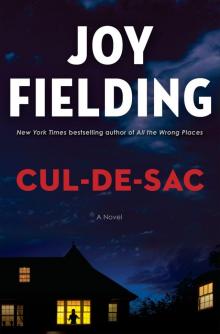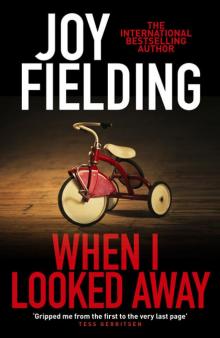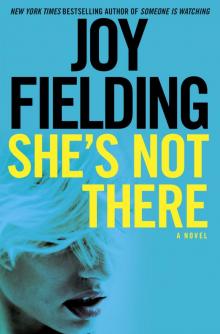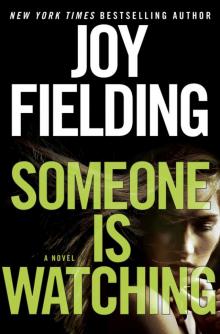- Home
- Joy Fielding
Heartstopper Page 6
Heartstopper Read online
Page 6
Candy, he heard the girl’s mother remind him, as she held out the picture of a petite, young woman with haunted, dark eyes. Actually, her real name is Harlene. Harlene Abbot. But she always hated that name. She called herself Candy. Said it suited her much better than Harlene. And, yes, I know, she’s disappeared before, and I know about the drugs and the men, but this time is different, Sheriff Weber. I know it’s different.
Why is it different this time?
Because no matter where she goes or how long she’s been away, she always calls me on my birthday. And this time, she didn’t. My birthday was the first of March, and I stayed home all day and waited, but she didn’t call.
Mrs. Abbot….
Something’s happened to her, Sheriff Weber. And nobody wants to help me ….
“Sheriff Weber?”
“What? Sorry?” John Weber jumped back into the present tense. Delilah Franklin was looking at him expectantly.
“I heard you’ve been asking questions about Liana Martin.”
“Have you seen her?”
Delilah shook her head. “Not since yesterday. You think something bad’s happened to her?”
“I hope not. How well do you know her?”
“Well, we’ve been in the same class ever since we were kids, but we’re not exactly friends. You know how it is. Liana’s really popular. And really nice. Not like some of the others. She’s always been very nice to me. I like her,” Delilah concluded with an emphatic nod of her head.
“Did she ever say anything to you about any problems she might be having at home or with her boyfriend?”
“Oh, she wouldn’t tell me anything like that. You’d have to ask Ginger or Tanya about stuff like that.”
I already have, he said silently, deciding it was definitely time to go home.
“Sheriff Weber?” Delilah asked again in that incongruous little voice, as her worried eyes made the obvious connection. “You don’t think anything’s happened to my mother, do you?”
“I think your mother’s probably at home right now, worried half to death about you,” John told her, downing the remainder of his beer and leaving a tip for the waitress on the table. “Come on. You need a lift home?”
“That’d be great. Thanks. It’s a long walk. Especially in the dark.” Delilah smiled timidly.
John Weber took her elbow, led her toward the front door.
“Oh,” she said, stopping abruptly, turning away and blushing visibly, even in the dark.
“What’s wrong?”
“It’s Mr. Peterson.”
“Mr. Peterson?”
“My science teacher.” She pointed with her chin toward a man hunched over in a corner booth. His arm was draped possessively around the shoulders of a girl who looked several decades his junior. The girl looked noticeably upset.
“Who’s he with?”
Delilah shook her head. “I’ve never seen her before, but there are all these rumors.”
“What kind of rumors?”
“That he likes younger women,” she whispered conspiratorially as they stepped out into the night.
They were almost at Delilah’s house when John realized he’d forgotten his burgers. His stomach rumbled its displeasure as he watched Delilah open the front door of her modest two-story home, then turn back, telling him with a shake of her head that her mother had yet to return. “Not a good sign,” John said as he pulled the car away from the curb and headed for home.
FIVE
Delilah watched the sheriff’s car pull away from the curb with a mixture of gratitude and regret. Gratitude because she hadn’t had to walk the fifteen blocks home from Chester’s—she was tired enough from the long walk over—and regret because she hated to see the sheriff drive away. She’d always liked Sheriff Weber. Unlike a lot of the people in Torrance, he’d shown her nothing but kindness, and she always enjoyed talking to him. He looked her right in the eye when he asked a question, listened respectfully as she answered, and never told her she’d be such a pretty girl if only she’d lose a few pounds. Probably because he’d packed on more than a few pounds himself since he’d stopped seeing her mother, she thought, closing the front door behind her and wondering where her mother could be.
Officially, she wasn’t supposed to know about their affair. Kerri, as her mother preferred Delilah to call her—she said it made her feel younger, although Delilah always suspected it was more because she was embarrassed at having produced so ungainly an offspring—had never directly acknowledged her relationship with the married policeman, although it had been pretty much an open secret around Torrance while it was going on. She’d dropped a few broad hints—something about liking men in uniforms, and not having to worry about speeding tickets for a while—but that was it. Whenever Sheriff Weber had dropped over to the house, Kerri had explained he was there on official business. Delilah never questioned her, even when the kids at school started making none-too-veiled comments about their affair, and even after her grandmother pointedly questioned the logic of throwing away money on cosmetic surgery for her daughter if the stupid girl was going to waste it on a married man. Since Kerri had already decided it was better to look good than feel good, her affair with John Weber had come to an abrupt end. Soon afterward, Kerri had left for Miami to have her already enlarged, “bee-stung” lips “stung” again.
Delilah had lost track of the number of surgical procedures her mother had had over the years. Sometimes, when she couldn’t sleep, she made a game of trying to count them—her own, more modern version of counting sheep. Aside from the regular injections of Botox and Restylane, she remembered the nose job, the brow lift, the tummy tuck, the liposuction on her thighs, the several eye jobs, the two breast augmentations—the first time they weren’t big enough—and the face-lift. The face-lift was the worst because her mother had come home from the clinic looking as if she’d been run over by a Mack truck. Bruises blackened her eyes and covered virtually every inch of her swollen face, although within a few weeks the swelling had gone down, and the bruises had faded, and Kerri was pretty much back to normal. Whatever normal was, the words normal and Kerri Franklin in the same sentence being somewhat of an oxymoron. If that was the right word for it. Delilah made a mental note to ask Mrs. Crosbie about it.
Delilah liked Mrs. Crosbie. Not only was she a good teacher and a kind person, she looked the way mothers were supposed to look. The sad truth was that Delilah barely recalled what her mother really looked like. The naturally beautiful young woman proudly holding her new baby in old family photographs was a complete stranger to her.
Delilah enjoyed looking through the old family albums as much as her mother and grandmother despised it. She liked seeing her grandmother sitting imperiously on her folding chair at the beach, as if it were a throne, her fleshy knees up around her chin; she got a kick out of her grandfather clowning around in her grandmother’s big straw hat, and Kerri and her two sisters happily riding the ocean waves.
Now her grandfather was dead, as was her mother’s oldest sister, Lorraine. Her other sister, Ruthie, had moved to California a decade ago and rarely kept in touch anymore. Which left just the three of them—Delilah, her mother, and her grandmother. The unholy trinity, her mother liked to joke. Where was her mother anyway?
“Kerri, is that you?” her grandmother called from the living room.
“No, Grandma Rose. It’s me.”
“Oh.”
There was no disguising the disappointment in her grandmother’s voice, although in truth, her grandmother had never tried to mask her disappointment in her only granddaughter. Delilah entered the cluttered living room. It was hard to say what exactly it was cluttered with. There weren’t any books or old newspapers lying around—neither her mother nor her grandmother ever read anything other than fashion magazines—and the room was certainly clean enough. It was just full of stuff. Lace doilies were everywhere—on top of the tan sofa, the brown leather chair, the television, the end tables on either side of the sofa.
The latest issue of Vogue lay beside a small stack of In Shape magazines across the glass coffee table in the middle of the room. A glass-doored, mahogany cabinet stood in one corner of the room, next to a grandfather clock that hadn’t worked in years. The cabinet was filled with dishes made of Depression glass in translucent pink and green, as well as Grandma Rose’s collection of old china figurines. Her grandmother called them antiques; her mother called them garbage. She confided to Delilah she was going to throw everything out—“the whole kit and caboodle,” she liked to say—as soon as Grandma Rose passed on.
Kerri always said “passed on” instead of “died.” She also said things like “kick the bucket” and “bite the dust,” although never in front of Grandma Rose, who considered such irreverent expressions sacrilegious. Delilah knew Kerri put up with her mother’s ill temper and demanding ways because she hoped to inherit all her money when she died. Whoops, Delilah thought. Make that “passed on.” She might have laughed had Grandma Rose not been sitting there looking as if she’d just stumbled onto a nest of sleeping serpents.
Was that a metaphor? Alliteration? Maybe both. Something else to ask Mrs. Crosbie about.
“How are you doin’, Grandma Rose?” Delilah asked now, approaching with caution. Her grandmother sat at the edge of the sofa’s middle seat, her swollen feet stuffed into tatty pink slippers that barely touched the floor, her large, masculine hands entwined in her lap. Her hair was colored a deep auburn red, although the gray at her hairline betrayed her need for a touch-up. Her face was round, her features coarse, her brown eyes cold and unforgiving. Weren’t grandmothers supposed to be soft and kind? Weren’t they supposed to welcome you home with open arms and freshly baked cookies?
“How do you think I’m doing?” came her grandmother’s response. “I’m worried sick.”
“I’m sure Mom’ll be home any minute,” Delilah said, although she was sure of no such thing. What was her mother doing anyway? Why hadn’t she called? “She hasn’t phoned?”
“If she’d phoned, would I be so worried?”
“I guess not.” Delilah let out a deep breath and tried not to let her annoyance show. She tried to tell herself her grandmother was snapping at her because she was worried about her daughter, but in truth, snapping was her grandmother’s normal way of communicating. No wonder Kerri took every opportunity to be elsewhere. No wonder she was in no hurry to get home. No wonder she spent so much time at her computer when she was home, preferring the quiet of Internet chat rooms to the noise of real people. If someone snapped at you online, you could simply snap them off.
“I thought it was her when I heard a car pull up.”
“That was Sheriff Weber’s car. He gave me a lift home from Chester’s.”
“Too bad,” Rose said. “You could use the exercise.”
Delilah forced her lips into a smile as she headed for the kitchen. “Can I get you anything, Grandma? Some Coke or some juice?”
Rose shook her head. “No. And you shouldn’t have any either. Do you have any idea how much sugar is contained in one glass of Coke? And they say orange juice is just as bad. Did you know that?”
“I think you’ve told me that, yes.” At least five hundred times, Delilah added silently, stepping into the small kitchen and opening the fridge, stretching for a can of Coke near the back.
“Stick with water,” her grandmother advised, as if she were standing right behind her. “They say you should drink at least eight glasses of water a day. Did you know that?”
“That’s an awful lot of water,” Delilah said, releasing the can’s metal tab. A rush of fizzy gas burst into the air, tickling the bottom of Delilah’s nose. She raised the can to her lips, took a long, satisfying gulp.
“Foolish girl,” Rose muttered, loud enough to be heard.
“You sure you don’t want anything? I think there’s some ice cream left.”
“Lord, no. They say you shouldn’t eat anything after seven o’clock.”
“Who’s they?” Delilah returned to the living room, clutching her can of Coke with grim determination, and plopped herself down on the brown leather chair. It made a great whooshing sound, as if groaning under her weight.
“Everybody says it,” Rose said, as if this were answer enough. “It’s common knowledge. And be careful with that Coke. If you spill it—”
“I won’t spill it.”
“—you clean it up,” her grandmother continued, as if she hadn’t spoken.
The two women sat in silence for several seconds.
“So, how is Sheriff Weber?”
“Fine.”
“What was he doing at Chester’s?”
“Having a beer.”
“I take it his wife wasn’t with him?”
Delilah shook her head. “He was there on business.”
“Business?” Her grandmother raised one thin eyebrow.
“Liana Martin’s missing.”
“What?”
“Liana Martin. A girl in my class. She’s missing.”
“Judy Martin’s daughter?”
“I guess.”
“Beautiful woman. She was runner-up for Miss America once, you know.”
“I don’t think it was Miss America—”
“What do you mean, her daughter’s missing?” her grandmother interrupted.
“Apparently she didn’t come home last night, and nobody’s seen her since yesterday afternoon.”
It took several seconds for the full impact of that statement to sink in. “What does the sheriff think happened to her?”
“He doesn’t know.”
“She probably just ran off,” Rose said dismissively, although she sounded less than convinced. “Why did you tell me that?” she demanded seconds later. “Can’t you see I’m worried enough as it is?”
“Don’t worry, Grandma. I’m sure Liana will turn up.”
“I’m not worried about her, for God’s sake. I’m worried about your mother. If there’s some maniac out there—”
“Whoa, Grandma Rose. Who said anything about a maniac?”
“I have a bad feeling about this.”
“You’re starting to scare me.”
“What have you got to be scared about? Even a maniac would have more sense than to mess with you.”
Tears instantly filled Delilah’s eyes. So now she was so repulsive even a maniac wouldn’t touch her. She raised the can of Coke to her lips, didn’t lower it again until the can was empty. By then her tears were gone. She stood up. “Would you like me to put on the TV, Grandma?”
“No. There’s never anything on the damn thing. Maybe you should go out again. Have another look around.”
“I’m tired, Grandma. Besides, Mom’s probably with Dr. Crosbie.”
“No. He has his kids tonight. You don’t think she’s been in an accident, do you? Your mother’s not the best driver in the world, you know.”
“I think someone would have phoned.” Where was her mother? Why hadn’t she called? “Why don’t you get ready for bed, Grandma. It’s late and—”
“—and your mother’s not home. And a young girl is missing. And how am I supposed to get any sleep until I know she’s safe and sound?”
“You’ll make yourself sick,” Delilah warned, although she didn’t believe it. Her grandmother was a force of nature. She was indestructible. She’d survive Armageddon. Grandma Rose and the cockroaches. Sounded like a good name for a band.
“You can get ready for bed, if you’d like,” her grandmother was saying. “You don’t have to keep me company.”
“I don’t want to leave you alone.”
“That’s all right. I’m used to it.”
Delilah rolled her eyes toward the ceiling as she approached the sofa and leaned forward to give her grandmother a kiss on her dry, flaky forehead. Was it her imagination or did her grandmother flinch at her touch? “Sheriff Weber said to call him if Mom wasn’t back by midnight,” she said as she walked from the room.
“Midni
ght?” Rose repeated, as if it were a four-letter word. “Midnight?”
The angry epithet followed Delilah up the stairs and bounced off the pale pink walls of her bedroom. She sank down on her narrow twin bed, the white-and-pink-flowered comforter billowing up around her wide hips. Pink broadloom covered the floor; pink-and-white-checkered curtains framed the window overlooking the street; a pink lampshade sat atop a delicate white lamp that itself sat atop a white dresser, the dresser hand-painted with pink flowers. It was the ultimate little girl’s room, Delilah thought. No cliché had been forgotten or left out. And it didn’t matter that its occupant had long ago outgrown the doll-size bed and lost interest in the plush, stuffed animals lining the bookshelves. What mattered was the dream of feminine perfection. What mattered was the ideal.
Except Delilah was as far from the ideal of feminine perfection as a girl could get. Even as a child, she’d fallen short of the room’s expectations. While she’d weighed only a puny six pounds at birth and was a pretty average-sized toddler, her weight had begun to climb in the years following her mother’s second divorce and had continued its steady ascent, reaching a peak of 163 pounds over the Christmas holidays. While, at five feet five inches tall, this was more than enough to label her as heavy, it was hardly enough to qualify as obese.
She glanced toward the window, her gaze falling to the computer on her desk. Her classmates regularly posted such horrible things about her on their websites. They called her names and made vile, lewd comments about her sexuality. Joey Balfour was the worst. And Greg Watt. To think she’d once thought Greg kind of sweet. One day, when she’d worn a new blouse to class, he’d actually told her she looked nice. That simple statement had kept her afloat for weeks. She’d replayed the compliment endlessly in her head—You look nice. You look nice. You look nice—until eventually the words became warped and indistinct, like a CD that’s been played too many times. At any rate, those words had long since been replaced by others.

 The Stranger Next Door
The Stranger Next Door Cul-de-sac
Cul-de-sac The Final Act
The Final Act When I Looked Away
When I Looked Away She's Not There
She's Not There All the Wrong Places
All the Wrong Places Now You See Her
Now You See Her Don't Cry Now
Don't Cry Now Good Intentions
Good Intentions Still Life
Still Life Lost
Lost The First Time
The First Time Whispers and Lies
Whispers and Lies The Other Woman
The Other Woman Charley's Web
Charley's Web Mad River Road
Mad River Road Puppet
Puppet Life Penalty
Life Penalty The Wild Zone
The Wild Zone Home Invasion
Home Invasion Someone Is Watching
Someone Is Watching Heartstopper
Heartstopper See Jane Run
See Jane Run The Bad Daughter
The Bad Daughter Shadow Creek
Shadow Creek Missing Pieces
Missing Pieces Kiss Mommy Goodbye
Kiss Mommy Goodbye Grand Avenue
Grand Avenue